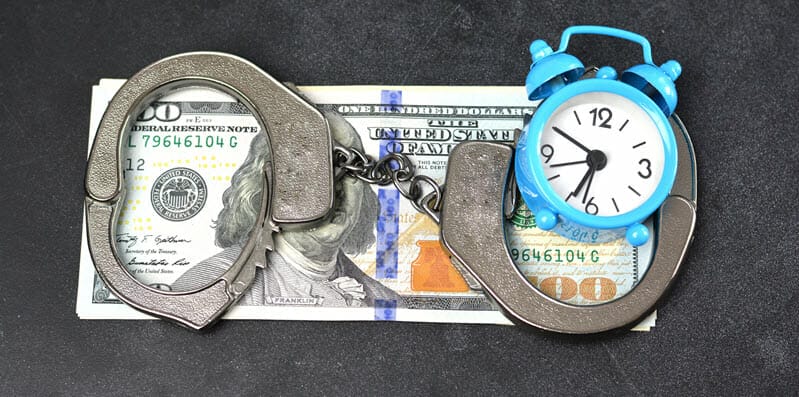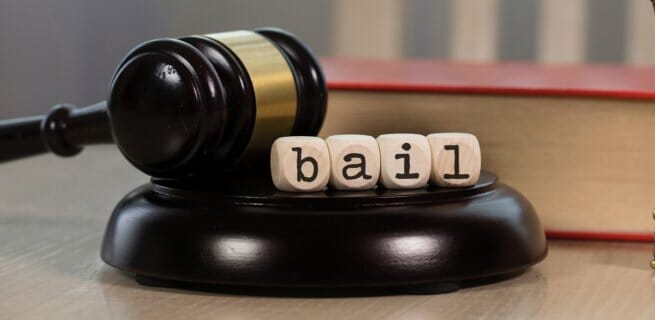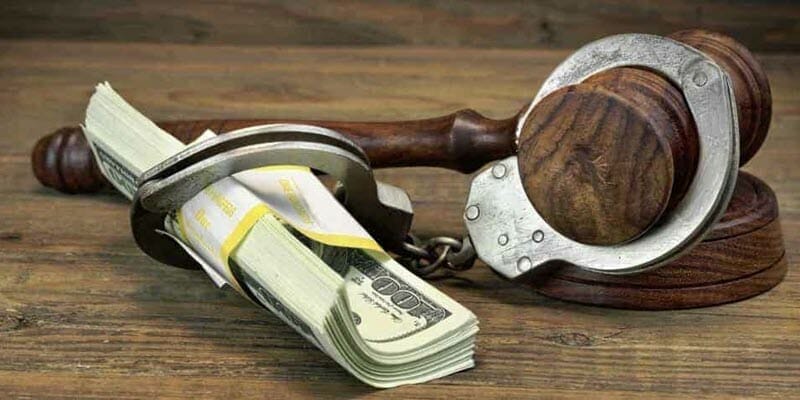
- Felonies
- *
- Misdemeanors
- *
- Drug/Narcotics Violations
- *
- Sex Offenses
- *
- Gun / Weapons Violations
- *
- Robbery
- *
- Burglary
- *
- Assault
- *
- Theft
- *
- White Collar Crimes
- *
- Domestic Assualt
- *
- Property Damage
- *
How Long Can You Remain in Custody Without Being Charged?
Getting arrested is stressful for anyone, especially those who have never experienced the process. Most people want to get out of jail as quickly as possible. As an accused person, you need to understand the following:
- Your arrest rights according to the law
- What to expect from the arrest process
- When you can expect to be released
- How to manage your time in jail
Your Right to a Speedy Trial, Regardless of Your Criminal Record
After an arrest, the law states that you have the right to a speedy trial. The Sixth Amendment guarantees this right, but that does not mean you will get a hearing the same day you're taken into police hold.
Your right to a speedy trial by law within a reasonable time limit means the prosecutor will need to try your case to determine if there is substantial evidence and probable cause to pursue formal charges. Criminal cases may go on to trial, get dismissed, or settle outside of court.
How Long Can a Police Officer Hold You in Jail?
A general rule of law states a person cannot be held for more than 72 hours without being released or charged with a crime. Although the length of time inmates are held varies by state, most states adhere to the 72-hour guideline.
It is significant to note that the 72-hour rule does not apply to weekends or holidays. If you get arrested on or near one of these, you can expect delays in processing.
To adhere to the 72-hour rule, some prosecutors will release defendants if they cannot file rush charges for crimes committed. A release does not mean you are off the hook.
A prosecutor could still decide to file criminal charges. The prosecutor could mail your charges or ask the court to release a warrant. Before being released, ensure your address is correct. Failure to show up for the arraignment will result in an automatic warrant.
What Happens After an Arrest?
If you've never been detained for crimes and arrested into custody, it is in your best interests to know what happens next. When you get arrested, you are not yet held on formal charges. You are being held on suspicion of a crime.
You must wait to be either formally charged or released. While waiting on the process, you will go before a magistrate judge who will determine your bail amount.
This arrest hearing differs from arraignment when you will be formally charged with a crime and enter into a plea deal.
Why Is There a Hold Limit?
Without limits in place, you could be held indefinitely. Limitations are put into place to force the arresting officers and district attorney to decide whether you will be formally charged.
Even though you may be suspected of committing a crime, you still hold specific rights according to the law. Hold limits protect your rights and prevent the prosecution and police from finding loopholes that allow them to hold you unreasonably.
By law, hold limits protect you from unwarranted delays. It is critical to note that remaining silent does not give the justice police or prosecution the right to extend your hold. You should contact a criminal defense attorney to protect your rights.
What Should You Do to Protect Your Rights After an Arrest?
After an arrest, you should exercise your rights and consider hiring a lawyer. The following steps will help protect your rights after being detained:
- Remain silent unless your criminal defense attorney is present. The officers may try to talk to you as your friend. Remember that this ploy is to get you to talk and admit guilt.
- Be courteous to all officers, judges, and jail staff. You do not want to get on their bad side.
- Unless you need immediate medical help, remain silent. If called in for an interrogation, politely inform the officers you will not speak with them until your criminal defense attorney is present.
- Contact your lawyer or attorney as soon as possible.
What Can You Do if Your Right to a Speedy Trial Is Violated?
How long can you be held in jail without being charged? Keep the 72-hour rule in mind, and remember that this does not include holidays and weekends. If you are held in custody for more than 72 hours without being booked, your attorney or lawyer can help.
A violation of your speedy trial right could be resolved by your legal counsel going before the judge for a writ of habeas corpus. A writ of habeas corpus demands the police to bring an inmate before the judge and conduct an investigation into whether there is sufficient evidence to hold the defendant in jail lawfully.
What Happens After the Judge Grants Bail?
Once the judge decides on the amount, you have options for payment. If you have the cash to pay the amount, you can pay it in full to the court and be released.
Some courts of law accept a check, money orders, or credit card payments. You may find it more difficult to pay with a personal check or credit card in some jails. To avoid problems, consider paying with cash or a cashier's check.
What Happens if You Don't Have the Cash?
If you don't have the cash, you have the right to hire a bondsman to write a surety bond.
You will have to pay a percentage of the amount as a fee to the bondsman. You may also have to put up collateral.
If you show up for your court dates, the bond is dissolved, and all collateral is returned. The bondsman keeps the fee.
Should you fail to show up for court, the bond is forfeited. The bondsman will use your collateral to pay the the court.
Contact Us for Help During This Trying Time
We understand the confusion, fear, and stress you and your family can feel during this time. Reach out to us today to learn about your options for bail bonds. We are here to help you make sense of the arrest process.





